#aspd things
Text
people act like psychopaths are these beasts in society coming to get you, meanwhile in reality i’d rather never have to go near another human being again
#actually aspd#actually npd#aspd#npd#clusterb#actually mentally ill#actually bpd#actuallyaspd#actuallynpd#cluster b#actually antisocial#actually cluster b#cluster b personality disorder#antisocial personality disorder#aspd safe#psychopath#psychopathy#aspd thoughts#aspd positivity#aspd awareness#aspd feels#aspd things#mental illness#narc abuse isnt real#narc abuse isn't real#sociopathic#actually narcissistic#narcissistic personality disorder#actually borderline#personality disorder
87 notes
·
View notes
Text
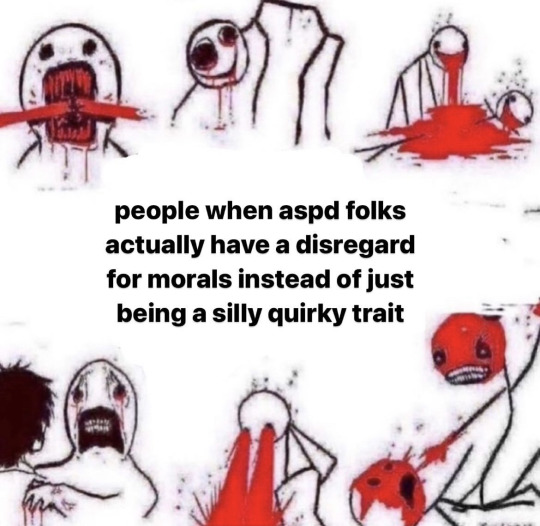
114 notes
·
View notes
Text
born to start a cult in the woods and plan a mass sewercide
forced to have a mental breakdown whenever i don’t get what i want
#actually bpd#actually borderline#bpd vent#bpd#bpd problems#bpd safe#bpd thoughts#actually aspd#actually mentally ill#aspd safe#npd safe#aspd culture is#aspd thoughts#aspd things#actually npd#hpd safe#cluster b safe
24 notes
·
View notes
Text

#aspd thoughts#aspd feels#aspd things#actually aspd#aspd traits#psychology#life quote#quotes#mental health#quoteoftheday#bipolar#bipolar girl#bipolar disorder#dark humor#dark#art
26K notes
·
View notes
Text
Welcome to my Ted Talk about AsPD, or Antisocial Personality Disorder, which the internet likes to coin as sociopath 👌🏻 if you don’t like long infodumps about stigmatized mental disorders from someone who is diagnosed, move on.
Quick toxic rundown: People with AsPD are generally characterized as emotionless, violent, manipulative abusers who kill animals and like to make other people their bitches. The biggest pet peeve we have is the emotionless, sadistic and abusive generalization.
Personally, we are highly neurotic, with highs and lows of: depression, frantic drive, self abuse tactics, chronic fear, lapses of rejection, overwhelming over-analyzation, grey area thinking, false goods and false bads, ultimatums, obsessive compulsive behavior, harsh self demands, and irritability.
AsPD is a disorder that is caused primarily (according to current research) by trauma and abuse in childhood; most notably being emotional neglect and absent caregivers that cause a child to have emotional shutdowns and repression episodes in an attempt to self soothe. Primary caregivers who do not bond with their children are also a factor. Children learn how to behave from those around them. If a primary caregiver is emotionally distant and unavailable, children will learn that is normal behavior and that’s how people are. If a primary caregiver does not provide empathy and sympathy during moments of distress and fear, children will learn that aloofness and disregard of others feelings is normal behavior. If a primary caregiver does not keep a child safe, children will learn that they should not prioritize their own safety or the safety of others. You can find my follow up post regarding this here.
Neglected and abused children often act out trying to get attention and help, often acting out in bad ways because they lack the ability to articulate what they’re feeling and what is happening to them. The pipeline for AsPD typically is: Oppositional Defiance Disorder as a child, Conduct Disorder as a teen, AsPD as an adult. There are a lot of warning signs cueing that AsPD is becoming a risk for development, but often kids do not have a support system to help negate it as it’s their support system that is usually a factor in its creation.
Being AsPD is like being an emotional La Croix 70% of the time. If you’re depressed, then it’s like someone in the other room has depression and is telling you about it. The other 30% of the time, if you’re depressed, your brain doesn’t understand how to handle it so it’s an ultimatum between doing something drastic to remove the Trigger or ignoring and dissociating for days on end.
People with AsPD are very good at ignoring things. Honestly it’s problematic as fuck but it’s not hard to ignore major issues when you just, don’t care. It’s not in the terms of being cruel or making ourselves not care, but the fact that finding the emotional willpower is so far out of our feasible reach we don’t do it. This causes us to piss people off because we don’t have the capacity to care as much as they want us to, even if we can and do to an extent.
Think of it this way: empathy/sympathy is a deep tub of water that everyone has. They can easily fill their measuring cup for the needed amount of empathy without any issues and it’s easy for them. People with AsPD don’t have a tub of water. We have shallow skillet. When we try to dip our cup to fill it, we can’t, it always comes up short and it is difficult to get any water in it as there is no room for the cup to dive. Our ability to care is limited because we do not have the same emotional resources everyone else does.
❌ False Positives & False Negatives ❌
I operate on what I’ve learned are called false positives and false negatives. These are things that are trained into the brain from an early age based off of childhood trauma and other factors. False positives are a distorted version of why we do something to help ourself and for our own good, meanwhile a false negative is something we do because it’s a threat, or based out of fear.
❌ Some of my false positives:
- It is good to be afraid of nothing
- It is good to adapt to someone’s personality if they are stronger than you
- It is good to isolate yourself
- It is good to be a silver tongue because you can get into any place you want
- It is good to become a social chameleon and shape yourself to whatever those around you need/want most, because then you have no chance of being abandoned
❌ Some of my false negatives, which can explain the false positives as well as core beliefs:
- it is bad to be afraid, if I am afraid then I am vulnerable and it can be used against me
- It is bad to be emotional or show concern for others emotions because they do not care for mine
- It is bad to be able to be exploited, because I believe it is everywhere
- It is bad to allow myself to be bored, because boredom begets bad thoughts and no one can or wants to help me when I spiral
- It is bad to not shape yourself to the social circle, because people quickly grow tired of those who do not match them perfectly and being discarded means I failed
My core beliefs can be viewed as the root for the false positives and negatives, because they are based on the core of trauma, abuse and neglect. They come from patterns and instances that make someone with AsPD become the opposite of what they experienced:
- eat or be eaten
- If I don’t show that my bite is worse than my bark, I will be taken advantage of and I must remain on top because the ones on top are safe
- I must look out for myself because nobody will do it for me
- It doesn’t matter what happens to me, therefore it doesn’t matter what people think of me
- If I cannot do something well, then I should not do it at all
- If you are dependent on others for emotional and mental well being, you are weak, therefore I must isolate myself to avoid becoming codependent and a burden and useless
- If I can handle the stress of a situation better than everyone else, therefore I will keep the problem (financial, emotional, mental, etc) to myself to reduce chances of being abandoned due to failure of perfection
People with AsPD are hard to get along with. We often:
- are always anticipating a fight
- lack respect for authority
- ignore social structures to an extent
- tendency to lie if it’ll lessen punishment or if we feel the lie is more acceptable than our actions
- limit social support because it’s wrong to be dependent on others
- have an inflated view of our own importance — which turns into a self ridicule for believing someome like me could be found important to others —
- can be rude and inconsiderate of others feelings somewhat unintentionally
- are unable to read the correct social cues in relation to empathy towards people and animals
- am constantly confused by others dependence upon empathy and inability to make desicions from logic based standpoints
We can’t speak for everyone who has AsPD, nor are we saying that no one with AsPD is capable of being a murderer/abuser etc. but we are saying that y’all need to stop automatically classifying someone as a certain “type” as soon as you know about their disorder.
One last thing I do want to point out is that it is not uncommon for people with AsPD to derive some sort of enjoyment in causing harm, doing something illegal, hurting someone or animals, etc. This entirely stems from lack of environmental control as a child. Being able to control what happens to others or being able to control the things you say or do that hurts someone else is a hefty high to get addicted to; it soothes the underlying itch of not being able to control your own trauma and abuse, so in turn you push these behaviors onto others and enjoy it because it gives you a sense of power and control. Some people with AsPD do genuinely love hurting others, and some enjoy hurting others when they believe it’s deserved or their ire has been stoked. Some enjoy causing pain to those they think deserve it, and others don’t care who they hurt as long as they feel like they’re in control of the situation.
Hope this have some insight into AsPD 🤙🏻 if y’all have any questions, shoot.
#antisocial personality disorder#aspd traits#aspd#aspd awareness#aspd thoughts#aspd things#actually aspd#antisocial pd#personality disorder#cluster b#glitcher system#did#actually did#did stuff#did system#trauma#childhood neglect#mentalheathawareness#mental illness#destigmatization#sociopath
1K notes
·
View notes
Text
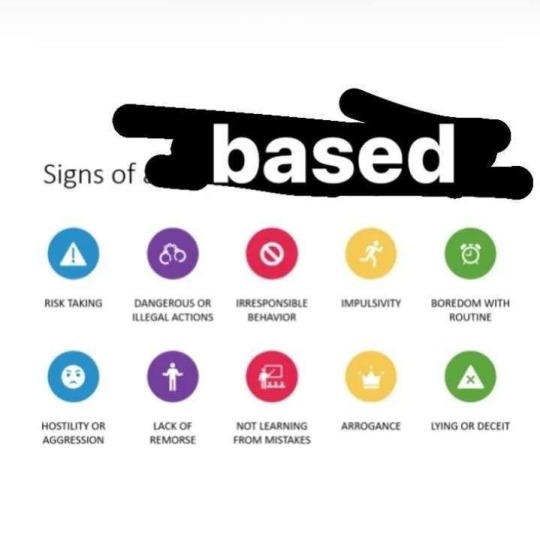
#aspd#aspd memes#cluster b#actually aspd#antisocial personality disorder#aspd things#cluster b pds#personality disorder
332 notes
·
View notes
Text
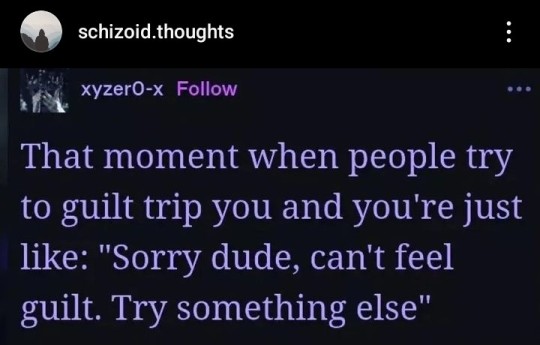
Guilt ? Never heard about it
#szpd#schizoid personality disorder#aspd traits#aspd#cluster a#personality disorder#cluster b#schizoid#aspd things
206 notes
·
View notes
Text
Googles advice on how to write an apology
“Show empathy”
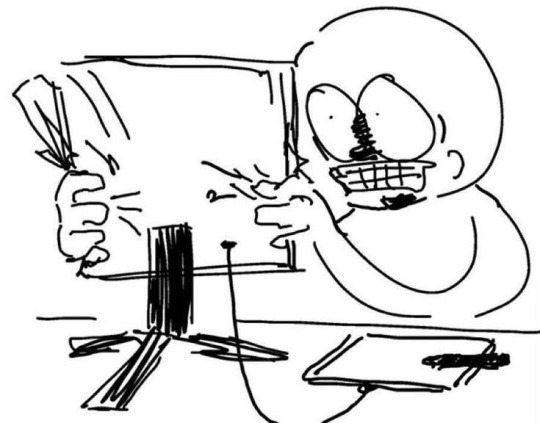
#actually aspd#aspd safe#aspd culture is#aspd#aspd traits#aspd thoughts#aspd things#cluster b#mental health#apology#empathy#low empathy
170 notes
·
View notes
Text
ASPD: The Desire for and Run from Intimacy
This post will only contain my personal opinion and experience. It may not be applicable to all other people with ASPD and may likewise be relatable to people who do not have it.
I am only going to be talking about emotional intimacy, but this post is definitely also applicable to the other type of intimacy!
I'll make myself pretty vulnerable in this post, by discussing my personal experience, so you better not make me regret that!
Abbreviations:
ASPD = Antisocial Personality Disorder
ASPD is a disability caused by prolonged childhood trauma (with many possible variations), that develops in order to protect the brain from said trauma, or rather to help the brain deal with it in some way!
While the consequences of this in the context of intimacy, look different for every person with ASPD, many do report: a difficulty with developing bonds, having problems trusting people & giving away control, losing feelings for people quickly and abruptly/getting "bored" of people, responding extremely to arguments, having problems dealing with peoples emotions/ problems with being close to people etc.
This may be due to a variety of factors, but does often tie back to having no or few positive experiences with intimacy, having not learned how to exist in relationships properly/a lack of being socialized, not having the necessary prosocial emotions and mechanisms to deal with it and other similar things.
While this causes some people with ASPD to develop a brain, that does not have a need for emotional intimacy at all, others develop a brain, that craves the emotional intimacy it has been denied, but which will also fight said intimacy at every turn.
Thats as much generalized info as I can give you, as the exact representation of this is highly individual, but I will offer my personal experience on the following slides!
What you need to know is that I was accidentally neglected for huge parts of my childhood and teens and did not get my emotional and social needs met most of the time, while also knowing that my parents were theoretically capable of that, as they were giving everything I lacked to my sibling.
This caused me to grow up with a burning desire for intimacy, while being disappointed by people time and time again, failing to actually develop the things needed to experience this intimacy and partially growing to resent it and viewing it as "weak" and "bad".
Ever since then I have been stuck in what I like to call the "ASPD stages of running". Theres different points in getting close to people (in any nature of a relationship), that'll send me running and feeling like I am "weak" for wanting it, or as if being close to people is the worst thing that could happen.
The stages (simply put) are:
1. Desiring/Daydreaming about my dream relationship
2. Looking at peoples relationships/Looking at people with the intent of getting closer to them
3. Talking to people (online or irl)
4. Getting closer / being friends with people
5. Being friends with people for longer
Optionally:
6. Getting so close that a romantic relationship may happen
7. The moment of getting in the relationship / the days after
8. Being in the relationship for a bit
At any of those stages, I'll very likely have one or multiple moments where my ASPD will try to get the better of me and will try to convince me to just run away, drop contact and never talk about it again. Even just admitting to this and talking about it is hard as fuck, because it is so deeply ingrained in my brain to see emotional intimacy as a weak and dangerous thing.
What this will look like exactly really depends on the person and situation, but things that have happened in the past were:
• blocking the person and everyone I am friends with and pretending I am no longer alive
• my brain fixating on their faults in order to give me a good reason to hate them so I don't get closer to them and can hold them at arms length
• responding less often/more dryly or ignoring messages entirely
• not replicating the energy of the conversation/relationship
• staging an incident so I ruin the relationship
• running at the first signs of a disagreement
• avoiding people when they are emotional
• feeling uncomfortable around people as a whole => isolating
• beating myself up about letting it happen again
• impulsively bumping the relationship to another stage, just to immediately regret it (in a "fuck that has consequences" way)
• shutting off all my emotions, dissociate or otherwise make sure to stop the feelings (or just lose them automatically)
To put it in a shorter and more simple way, I'll usually either get the fuck outta there, or make sure to change the relationship/my personal position in the relationship to a more comfortable and less vulnerable and intimate level. This may also just look like me shutting off, becoming distant, or seeming mad, when all I am is overwhelmed by the intimacy and grossed out that I actually need and desire that.
As you can possibly imagine, that is not the most useful thing, as it causes issues in relationships, cuts friendships short and makes dealing with people a lot harder!
The most frustrating thing about this for me though is, that even if the most perfect friend or partner came along and even if the relationship would work at first, I am very very likely to crash it against the wall, simply because my brain cannot handle having the things, that it needs and desires.
It desires a hug and runs from the one who offers it.
It needs help and bites the hand that does.
It needs love and gets grossed out by whoever offers it.
It wants attention and can't handle it when it gets it.
It wants gifts, but doesnt know what to do when it gets them.
Whatever it wants, it can't have, so it keeps wanting, keeps yearning, keeps desiring and has to watch itself be unable to accept any of it.
And if that sounds painful, thats because it is.
Its a vicious kind of pain when you have to watch yourself ruin yet another thing, because your brain can't handle it, while you scream at it in frustration to get its act together, because it also is everything you desperately need.
ASPD sucks when it comes to intimacy and it especially sucks when it comes to talking about it, or being honest about these problems. It developed to protect me from being too "weak" to deal with the trauma and now its practically preventing me from showing any "weakness" or seeking out what previously hurt me. Which wouldn't be this bad, if I didn't still have this kid in me that just wants to be loved and daydreams about all the things, the ASPD hates.
When your shell disagrees with your core and you're not strong enough yet to break your shell, what does that really leave you with, other than curling up into a spiky ball and letting the shell do its job? I know I still need the protection, but I wish it wasn't actively preventing me from learning to live without it.
First posted on my instagram (same @)
#actually aspd#aspd#mental health education#antisocial personality disorder#mental health#antisocial#aspd awareness#aspd feels#aspd thoughts#aspd things#aspd mood#intimacy
182 notes
·
View notes
Text
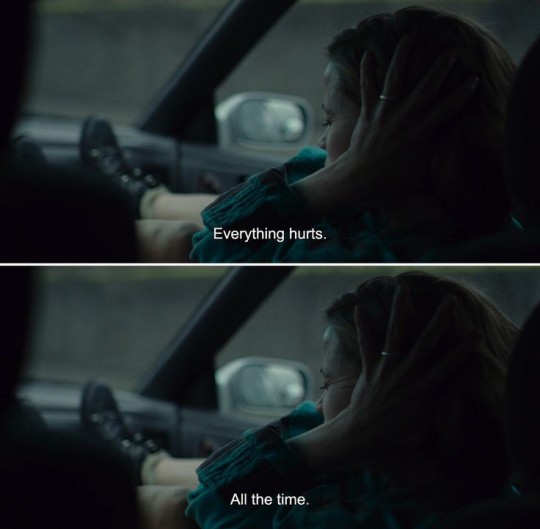
#d3pression#su1c1dal#tw depressing thoughts#mentally tired#depressing shit#sorry for being depressing#kinda depressing#suicudal#tw depressing stuff#cvtt1ng#deppresion#depressing post#depresszió#depressing memes#this is depressing#anxeity#anxitey#npd safe#aspd memes#aspd things#bpd#bpd blog#bpd meme#bpd yandere#bpd problems#actually bpd#bpd life#bpd favorite person#anxious#anxi4ty
2K notes
·
View notes
Text
I don’t have ASPD in the “crazy obsessive killer, looking to hurt everyone and anyone around him, abusive horrible person who should be in prison” way I actually have it in the “I will never been able to properly love anyone & it destroys me from the inside out, I am broken and undesirable, if anyone gets near me I’ll hurt them before they hurt me” way
#i have aspd but i relate to a lot of the traits of npd#aspd culture is#aspd safe#aspd traits#aspd thoughts#aspd awareness#aspd feels#aspd positivity#actually aspd#aspd#aspd things#cluster b safe#cluster b#antisocial personality disorder#personality disorder#pd#mental health#mental illness#love#relationship trauma#queer relationships#relationships
82 notes
·
View notes
Text
seeing NPD + ASPD positivity posts on any other platform being met with literal thousands of people flooding the comments to try and justify their ableism and discriminatory behaviour towards us is so fucking gut wrenching
#actually aspd#actually npd#aspd#npd#clusterb#actually mentally ill#actuallyaspd#actuallynpd#cluster b#actually bpd#actually antisocial#actually narcissistic#antisocial personality disorder#narcissistic personality disorder#narc abuse isnt real#narcissistic abuse#narc abuse isn't real#ableism#sanism#npd posting#npd positivity#aspd things#aspd safe#npd safe#npd vent#aspd positivity#aspd vent#mental illness#actually cluster b#cluster b personality disorder
168 notes
·
View notes
Text
Excuse my lack of response, you just said something that my brain decided is an attack now I hate you until further notice and I'd rather not talk to you because if I do I might say something hurtful and I'm trying to convince myself that I'm a good person
#aspd#npd#bpd#cluster b#actually aspd#aspd tag#aspd feels#antisocial#aspd thoughts#actuallyaspd#aspd things#antisocial pd#aspd traits#npd tag#npd awareness#actually npd#npd things#npd vent#bpd things#bpd vent#bpd thoughts#bpd stuff
1K notes
·
View notes
Text
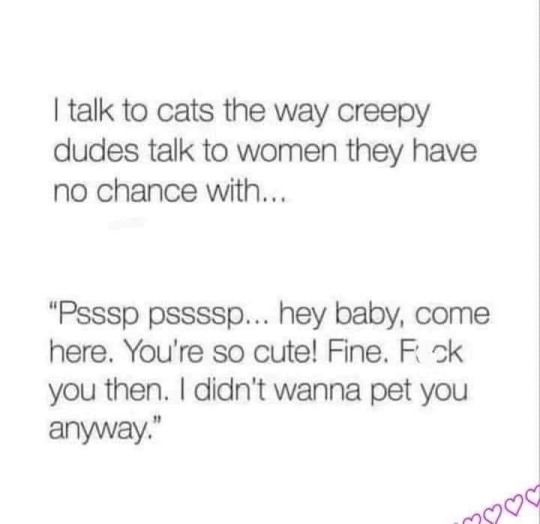
#aspd thoughts#aspd things#aspd feels#actually aspd#aspd traits#life quote#psychology#quotes#mental health#quoteoftheday#dark humor#dank memes#memes#funny#lol#i can relate#so relatable#hilarious#memesdaily#tumblr memes
2K notes
·
View notes
Text
something that has helped me disconnect from codependancy is realizing that married couples arent always together. they live together and spent time together but a lot of the time they just arent together but they still love eachother. they dont need to sleep in the same bed they dont need to constantly show eachother affection they can just coexist and still love eachother unconditionally. love isnt sacrificing every moment for someone, its having your life made better by their existence while you live
#actually bpd#bpd thoughts#bpd safe#bpd fp#bpd feels#codependency#recovering codependent#codependent no more#npd positivity#actually npd#npd safe#npd traits#npd posting#npd things#aspd safe#aspd#actually aspd#aspd thoughts#aspd feels#aspd things
36 notes
·
View notes
Text
ASPD and being a "bad person"
the backhanded support for aspd
There's a very backhanded type of support for people with ASPD. In attempts to get moral highground and fight against the demonization/stigmatization of the disorder, it's almost entirely watered down to "Oh you just lack empathy and have mean thoughts :)". It's entirely infantilized to the point where people who actually exhibit their real symptoms are just "bad people", or "using their disorder as an excuse for their bad behaviour" because "that's not what ASPD is actually like!!"
Moralizing disorders does nothing but cause harm to people suffering from mental health issues. You cannot cherry pick which presentations of ASPD are deemed acceptable when the whole disorder revolves around being and doing socially unacceptable things.
"It's ok if you lack empathy!" Is the only support I really see for ASPD, which is true, but only if we don't have empathy in ways that they think is acceptable.
I don't have empathy for people of colour, or people with disabilities, or trans folk. My empathy can't just turn on for people who I know deserve it. I can't relate to their struggles, I can't feel for them, I can't even really care. And lacking the empathy required for me to feel these things towards others is exactly what causes me issues in my life. It's socially unacceptable. It's dysfunctionally anti-social.
But thats very much the tip of the iceberg. Lacking empathy isn't even in the DSM-5 criteria for ASPD, and a lot of people with ASPD do experience empathy in their own way.
There's also the issue of "it's ok to be angry, it's ok to have mean thoughts, as long as you don't act on them" or "it's ok to not care, as long as you pretend you do" or "it's ok if you lack empathy as long as you're compassionate"
The issue is that people with ASPD are only supported and accepted if they're in a place where they can conform to prosocial behaviour, which is incredibly difficult to do and does require a degree of recovery. And not a lot of people are willing, or able to, get to that point in recovery.
If you say you support people with mental health issues, then you need to accept the part that actively causes problems as well, even if it makes you uncomfortable. You can't just love the "antisocial personality" and hate the "disorder".
People with ASPD will act in ways that makes them a morally "bad person". That's the entire premise of the disorder. If you water it down to the point where the person suffering has to be good and follow your social standards, then that's not an anti-social disorder anymore.
And I know it's hard to stomach people with ASPD sometimes, especially if they're not in recovery at all. We can be mean, insensitive, aggressive, insulting, morally skewed, or just a complete asshole in general. We can say unacceptable things, we can do wrong, and we're prone to it. You don't have to like someone to support them.
Supporting someone with mental health issues doesn't mean you have to like what they do, or who they are, or be friends with them. You're allowed to remove someone from your life if they're causing issues in yours. Supporting someone with mental health issues means you are able to leave them alone, and not go out of your way to shame them for things currently out of their control.
Yes, recovery is very important, but trust me as a recovering addict and someone with ASPD, you cannot force someone to be better. All they need is to know that they have room to breathe and grow. Support is giving people the space to do that. Backhanded 'support' is saying that you'll let them have that space but only if they currently fit in to your personal standards.
#opinion#aspd#cluster b#psychology#actually aspd#antisocial personality disorder#aspd things#cluster b pds#personality disorder#aspd awareness#aspd positivity
112 notes
·
View notes